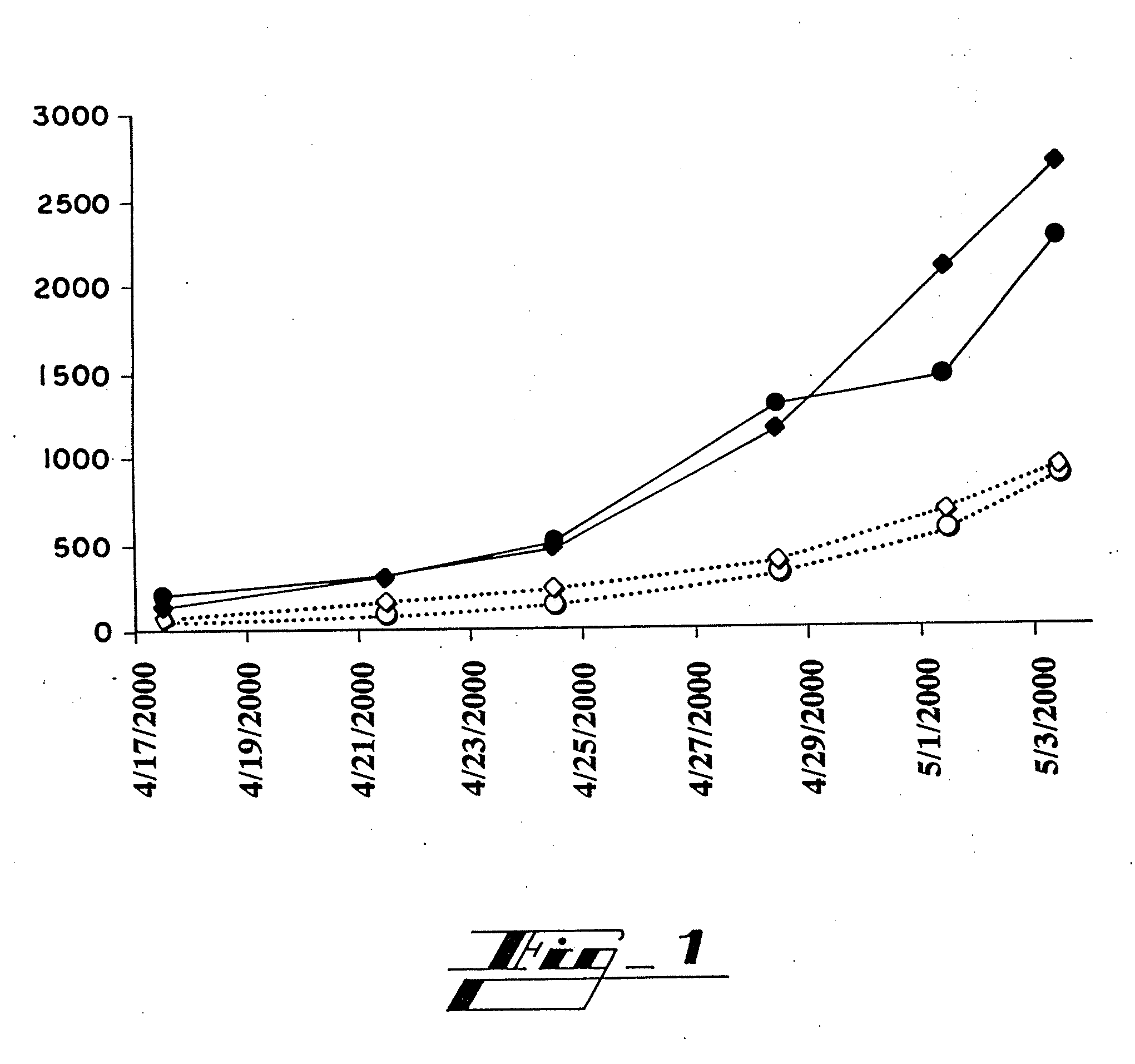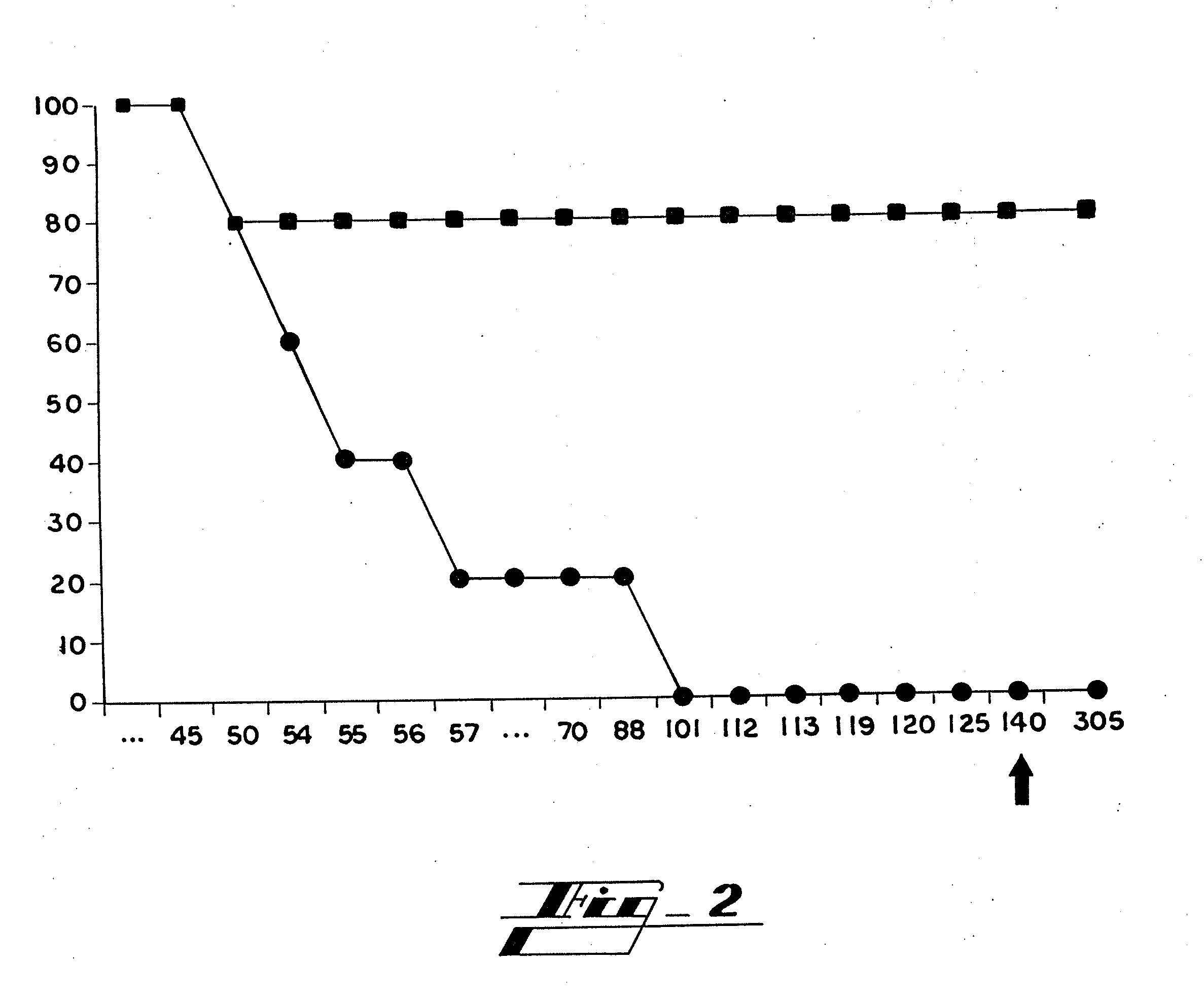GBS Toxin Receptor Compositions and Methods of Use
a technology of toxin receptor and composition, which is applied in the field of gbs toxin receptor composition, can solve the problems of impaired sensory perception, death or profound disability, seizures, etc., and achieve the effects of reducing the incidence of, reducing the severity of, and attenuating the severity of pathoangiogenic conditions
- Summary
- Abstract
- Description
- Claims
- Application Information
AI Technical Summary
Benefits of technology
Problems solved by technology
Method used
Image
Examples
example 1
Immunization with a Mixture of Three Fragments from Human GBS Toxin Receptor Retards Tumor Growth
[0095]Peptides Hab1, Hab2 and Hab3, which are shown in Table 3, are fragments from amino terminus of HP59 that were selected as immunogens based on hydrophilicity. They were synthesized in vitro (Sigma-Genosis, The Woodlands, Texas) and conjugated to keyhole limpet hemocyanin (KLH), a glycoprotein which served as an adjuvant. Experimental C57 mice (n=8, four males and four females) were immunized by subcutaneous injection of 100 micrograms of a mixture of the three peptide conjugates in complete Freund's adjuvant (CFA). Two weeks, four weeks and six weeks later, each of these mice received a subcutaneous injection of 100 micrograms of this mixture in incomplete Freund's adjuvant (IFA). A final injection of 100 micrograms of this mixture in IFA was given intradermally at eight weeks. Control C57 mice (n=8) were immunized at the same times in the same manner with only KLH and Freund's adju...
example 2
Treatment of Immunized Mammals with CM101
[0097]Mice immunized and challenged with tumor cells as described in Example 1 may additionally receive weekly intravenous infusions of 60 μg / kg of the GBS toxin CM101 (CarboMed, Inc., Brentwood, Tenn.) or mock injections. Tumor progression is compared in the CM101-treated and control mice and the degree of tumor growth retardation or elimination is calculated using standard statistical methods. Additional experiments at different dose levels are conducted to determine a dose-response relationship.
example 3
Treatment of Immunized Mammals with Immunocompatible Antibodies
[0098]Mice immunized and challenged with tumor cells as described in Example 1 may additionally receive weekly injections of 100 μg of a mixture of mouse monoclonal antibodies specific for HP59 or mock injections. Such antibodies are obtained by immunizing mice with 100 mg of the synthetic peptides shown in Table 3 in accordance with the methods taught in Harlow et al., ANTIBODIES: A LABORATORY MANUAL, Cold Spring Harbor Press, pp. 139-240 (1989). Tumor progression is compared in the antibody-treated and control mice and the degree of tumor growth retardation or elimination is calculated using standard statistical methods. Additional experiments at different dose levels are conducted to determine a dose-response relationship.
PUM
 Login to View More
Login to View More Abstract
Description
Claims
Application Information
 Login to View More
Login to View More - R&D
- Intellectual Property
- Life Sciences
- Materials
- Tech Scout
- Unparalleled Data Quality
- Higher Quality Content
- 60% Fewer Hallucinations
Browse by: Latest US Patents, China's latest patents, Technical Efficacy Thesaurus, Application Domain, Technology Topic, Popular Technical Reports.
© 2025 PatSnap. All rights reserved.Legal|Privacy policy|Modern Slavery Act Transparency Statement|Sitemap|About US| Contact US: help@patsnap.com



